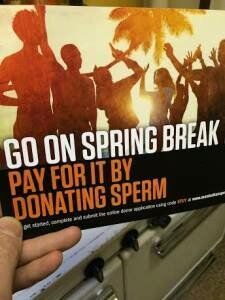Cognition
Thinking About Selling Your Sperm or Eggs?
A few practical, ethical, emotional, and medical issues to consider.
Posted August 25, 2022 Reviewed by Lybi Ma
Key points
- Selling sperm or eggs is much more than a financial transaction with a sperm bank or egg facility.
- Gamete vendors do not keep, nor are they required to keep, accurate records of live births or of medical issues.
- Many donor-conceived people are curious about their close genetic relatives.
Are you thinking about selling your sperm or eggs? It is important to consider the ongoing ramifications for you and your (current and future) family and for the donor-conceived children born who will inherit 50 percent of their DNA from you.
When purchasing sperm or eggs, most people are given a "donor profile" with non-identifying information about the donor, including a one-day snapshot of self-reported medical information.
Medical and Psychological Issues
The medical information that you fill out for the donor profile that's sold to prospective parents is only a snapshot of one day in your (young and healthy) life. If you or a member of your immediate biological family develop a medical or psychological issue following the initial completion of the self-reported medical history, it would be crucial to share this information with the families who purchased the gametes.
It's not just your looks, intellect, temperament, or athletic abilities that might get passed along, as susceptibility or predisposition to disease is also often inherited. Many diseases are adult-onset, and for many years after the original donation, children who share their DNA may develop medical and psychological concerns that sometimes can only be properly addressed with updated information from you. Conversely, it might be important for you to know about any medical issues reported by your progeny, as they may affect you and your own current or future children. Certain medical and psychological conditions carry genetic components that are not readily tested for, and accurate information is vital for proper screenings, testing, and preventive care.
If You Have Children of Your Own or Plan To
Cryogenically frozen gametes can be sold by gamete vendors (sperm banks and egg facilities) for many years into the future, so you could have genetic offspring born decades from now. Have you considered the possibility that your children may encounter biological half-siblings? Gamete vendors do not keep, nor are they required to keep, an accurate record of live births resulting from any specific donor. What this means for the children born with your DNA is that there may be many half-siblings, despite the sperm bank's false promises of limits. Half-sibling groups of more than 100 are now not uncommon and some are even larger than 200.
The children that a donor is raising, or their future children, might someday randomly meet their half-siblings—those who have been created from the sold gametes. There are countless stories of half-siblings meeting at school, at camp, at a park, at college, at the beach, on a Disney cruise, or on the same Little League team. These meetings among half-siblings are not uncommon, so honesty is essential. Before donating, potential donors should consider their willingness to be forthright with their spouse/partner and children. There are ramifications of these potential meetings beyond mere curiosity. Consider the potential problems that could occur from a romantic relationship with a half-sibling. One half-sibling recently reported that they swiped right on their half-sibling Tinder match.
“Anonymous” Donations
It is important to understand that because of advances in DNA testing and Internet search engines, the likelihood of you remaining anonymous is almost impossible, no matter what you're told by the gamete vendor. Even if you never test your own DNA, your progeny can match with any member of your family (even very distant relatives) and then easily trace the path back to you. It is important that all potential donors consider the strong likelihood that they will be contacted by offspring or their parents. This can happen at any time, long before the mandatory 18 years of anonymity that egg clinics and sperm banks still promote and require. How would you respond if you were asked to meet with your genetic offspring?
How You Might Feel in the Future
Have you considered how you might feel in the future about selling your gametes? It is almost certain that more than one child will come to exist. These children are genetically your offspring, sharing around 50 percent of your DNA, and, in fact, they may one day have children of their own who will be your genetic grandchildren.
If you haven’t yet told your partner, spouse, parents, or children about selling your gametes, you'll need to think about how this information could be potentially disruptive to them and rattle the family system, especially if the relationships are not already on solid emotional ground.
If you've been open with your family, and if they're open to meetings, this can be a time of excitement about the possibility of expanding your family. One Donor Sibling Registry member shared the following:
I am a previous egg donor to several different families, and I have come to feel that anonymous donation is unethical. I sincerely regret the anonymity on my end, and it weighs heavy on my heart. I was young and didn’t understand my options. I still absolutely respect the privacy and autonomy of the parents and children. I defer to whatever is best for the children that resulted from my donations and would like to make myself available to any and all families that are looking for information or connection in any form.
Imagine How the Donor-Conceived People Might Feel
Many will wonder about where they got some of their physical characteristics, or their talents, mental abilities, medical issues, and personality traits from. Many are extremely curious about genetic family history and ancestry, and many feel a deep longing to connect with and to know their unknown genetic parent and other close genetic relatives.
Imagine your reaction if your genetic offspring found you and expressed a strong desire to connect, or if they needed life-saving medical treatment. You need to consider these issues carefully as you make the decision on whether or not to sell your gametes. Your actions today can have an incalculable effect on the future.
Specifically for Women Thinking of Selling Their Eggs
There are unknown medical risks resulting from egg donation, and few longitudinal studies to date. Depending on the length of time since treatment, donors have reported coping with unpleasant short-term side effects such as changes in the menstrual cycle, ovarian hyperstimulation syndrome, an immune reaction, or muscle and joint pain. Some have also had to cope with more long-term issues regarding their own (premature) infertility following the procedure, concerns about decreased ovarian reserve, or breast cancer due to potential long-term effects of hormonal stimulation, which have not been well-researched to date.1,2 Former donors have reported feeling angry that they had not been well-informed about the possible medical risks of egg donation, as many clinics indicate that there are “no known risks” of egg donation because there have not been sufficient long-term studies.2
Much More Than a Business Transaction

"Come make $1400 a month doing what you'd do for free anyway."
Yes, that's an actual ad recruiting sperm donors. On the left is a picture of another one.
You'll see these types of flippant ads in college towns from coast to coast, in and on places like buses, trains, and in college newspapers.
What they are not honest about, among other things, is the very real possibility that you could end up with dozens or even hundreds of donor-conceived children that could find you long before the mandatory 18 years of anonymity.
Selling one's eggs or sperm is likely to reverberate across a donor’s lifespan.
References
1. Schneider, J., Lahl, J. & Kramer, W. (2017). Long-term breast cancer risk following ovarian stimulation in young egg donors: a call for follow-up, research, and informed consent. Reproductive Healthcare, 34, 480-485, http://dx.doi.org/10.1016/j.rbmo.2017.02.003 1472-6483
2. Kramer, W., Schneider, J. Schultz, N. (2009). US oocyte donors: a retrospective study of medical and psychosocial issues, Human Reproduction, 24, 3144–3149, https://doi.org/10.1093/humrep/dep309




